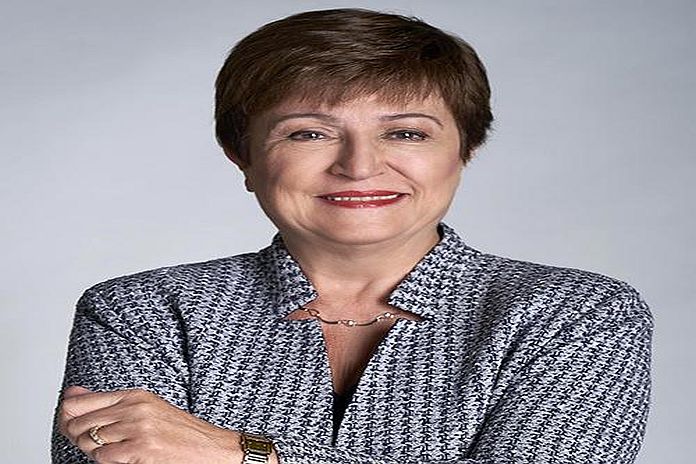- IMF Managing Director Kristalina Georgieva at the IMF-Singapore Regional Training Institute (STI)’s 25th Anniversary Event
I am very pleased to join Ravi Menon whom I highly respect and value for the leadership he provides to a fast-changing world of money. And I can say the fact that you were in that picture [of 25 years ago] does not surprise me because when it comes down to innovation, doing something that has not been done before he is the man!
I am also grateful to Ogata San for joining us and to Governor Chea, because now we have a gender-balanced panel as a result. This also speaks for the transformation that has happened in the IMF over the last decades, where we see gender equality in action!
I am making this point because I firmly believe that no country can succeed without tapping into the talent of all its people – men and women. It also symbolizes how much the IMF has changed as the world around has changed as well.
We have here an institution that is 25 years young. It is a reflection of how the IMF is changing – by turning more toward its members and seeking ways in which we are better integrated in the countries we serve. We have increased the number of regional capacity development centers to 17, and we recently inaugurated the center in Almaty Kazakhstan to serve the Central Asia and Caucuses region. We are also increasing the number of outposts through resident representatives and exploring platforms for engaging with parts of the world such as the Middle East through a new regional center financed by Saudi Arabia.
These centers are absolutely essential in a world of more uncertainty, rapid technological change, multipolarity, more diversity in economic policy, and last but not least – more frequent unexpected exogenous shocks. We all have to work harder to understand trends and translate these trends into policy recommendations for our members. We do that much more effectively when we have the transmission lines that these centers provide to us and to our members.
STI is a prime example. Let me quote a few numbers to illustrate. Since its establishment, we have trained here more than 21,000 government officials across 37 countries. These programs cover a range of topics but let me stress three areas.
The first is core IMF macroeconomic and financial sector issues with over 700 courses. Second is the expansion of teaching to cover new emerging issues such as climate change and digitalization. And last but not least, this center plugs into the leadership Singapore provides to the world in the area of digital money. It is not by chance that we are celebrating the 25th anniversary just before the fabulous Fintech Festival that Singapore is hosting, starting tomorrow.
I want to make three points for today. One, that this institute brings people together – to learn from each other and learn from the Fund. It is also a resource for us as we learn from you through these centers.
But learning is also accompanied with building networks and friendships. Many of the people who come through this institute have become senior officials in their own countries, retaining the networks they built while they were here. In one of the classrooms, I saw people from Mongolia, Papua New Guinea, Bhutan, Sri Lanka – from all over Asia and the Pacific region. As a former professor, I know that friendships that come studying together last for a lifetime.
My second point is to recognize that in a very dynamic world, the traditional policymaking that could take years is no more easily applicable. Policymakers have to be much faster, more agile, and they need to see through a degree of uncertainty that decades ago did not exist. So, what we do in this training is also to build that muscle of agility and adaptability that is helping policymakers of today and tomorrow to be more effective.
And finally, I want to say that I am particularly thrilled that this institute is the premier place on digital money, and specifically on CBDCs. Why? Of course, because of the role Singapore is playing and the high-value Japan attaches to supporting the IMF in building better knowledge and understanding in CBDCs at the time interest in CBDC is skyrocketing.
Just to give you an example. We took the pulse of how many countries are engaging with CBDCs. Over 110 of our members are at some stage of engagement – some are quite advanced; some are still at the point of exploration. And for us, the institute becomes not only the place to teach about CBDCs, but also a place to understand the dynamism and identify what are the critical questions we at the IMF need to help answer.
Questions like: how can CBDCs help promote financial inclusion? What could they do for more people and businesses to tap into the financial assets of the world?
Questions like how to onboard small businesses and informal merchants? How to make them part of the more formal system on the basis of CBDCs? And questions about interoperability of CBDCs: how could they be helping us with cross-border transactions given that, if the design is not oriented towards it, we may actually fragment, not integrate the world of money.
So, we are using the 25th anniversary to also launch our virtual CBDC handbook. I want to thank Japan for the support that you provided us for it. What it does is it gives a picture of lessons that we have learned; it also is an open system where more lessons will be brought in. And I count on all of you to help us enhance our knowledge.
I have no doubt the future of this institute is bright because of what you have demonstrated as possible from your past.





